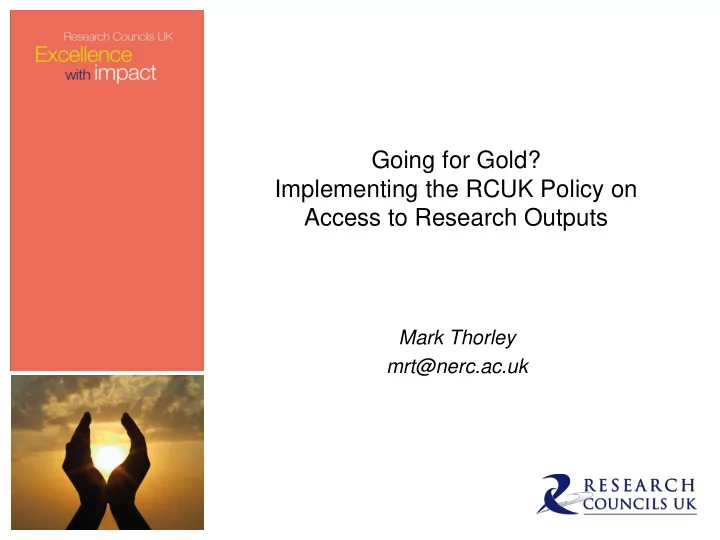

Going for Gold? Implementing the RCUK Policy on Access to Research Outputs Mark Thorley mrt@nerc.ac.uk
Challenges and Solutions Funding Licences Embargos
Policy in a nut-shell • Authors must publish in a RCUK Open Access compliant journal. • Journal achieves compliance through either: – Gold with CC-BY; – Green, author’s accepted manuscript, 6/12 months embargo and licence like ‘CC -BY- NC’. • RCUK preference is for Gold. However, choice is with authors and their institutions.
Transparency requirement • Acknowledgement of funding. • Statement on access to the underlying research materials. • Helps support the transparency, integrity and robustness of the research process. Science’s powerful capacity for self -correction comes from this openness to scrutiny and challenge. Science as an open enterprise Royal Society, June 2012.
Transition to Open Access • Working with the community to change the way the outputs from Research Council funded work are made available. • Five year transition to 100% OA – flexibility in implementation. Journey – not an event
Funding £11.2B
Funding • Research Councils providing block grants to institutions to support payment of APCs. • Institutions must establish Publication Funds and the processes and procedures for payment of APCs. • Flexibility on spend & ‘light touch’ guidance. Use the money to best deliver the RCUK Policy
Size of the APC fund • How many publications? – Est. 26k per year, 90% HEI, 10% RC institutes. • Average APC? – Finch £1727 + VAT, paid at 80% fEC = £1658; • Five-year transition period. HEI publications Year-1 Year-2 Year-3 Year-4 Year-5 Est. % Gold 45% 53% 60% 67% 75% APC fund £17M £20M tbc tbc tbc
Distribution of APC fund • Based on % share of direct labour funding received over past 3 years (£1.5B) – DI Staff and DA Investigators • Russell Group & 1994 Group – 37 HEIs, 82% • Cut off below £10k in year-5 (>99%) Brunel: 0.6% of APC fund. Year 1: £100k Year 2: £118k 82 < 1% 26 > 1%
Licences • Intellectual Property Rights – tools of public policy to support creativity and innovation. – But misused or misapplied can act to stifle that which they seek to protect. • Research Councils & Wellcome Trust – want to ensure maximum access to and reusability of peer-reviewed research papers. – Clear, consistent and open licences support this.
Gold – ‘CC BY’ • ‘CC BY’ - Creative Commons ‘Attribution’ licence. – Allows maximum re-use of published research papers, provided authors are properly acknowledged; – Removes ambiguity as to what reuse is, and is not, permissible, whilst protecting author’s moral rights; – Removes need to seek re-use permissions (except for 3 rd Party content) – thus supporting full text and data mining; – APC covers publisher’s ‘lost’ revenue.
Green – non-commercial re-use • Policy – ‘ journal must allow deposit …. without restrictions on non-commercial re-use ’. – Equates to ‘CC -BY- NC’ – though no specific licence type specified; – Publisher specific deposit licences (e.g. Nature) are acceptable provided they support the aims of the policy, and allow re-use including text and data mining; – Repository licences currently confused - restricting reuse potential (e.g. Europe PMC).
CC- BY ‘issues’ • Some concerns that CC-BY not appropriate. – Loss of reprint revenue for some bio-medical journals; – 3 rd party rights holders may be unwilling to allow their material to be included within papers licensed under CC-BY; – Some communities have concerns around mis- attribution, mis-quoting, mis-context and plagiarism. • If there is evidence of problems, will review licence requirements in 2014.
Green Embargo Periods • If journal does not offer a Gold option, must provide a short green embargo (6/12 months). • If journal offers Gold but author has no funding to pay APCs, 12/24 months green embargo is acceptable. • Some journals consider longer embargos (e.g. 36 months) necessary – proposing long article half- life requires long embargo period. • Is a long embargo really open access? How long should a user have to wait?
Supporting the Transition • Working with Sherpa-Romeo, JISC and Wellcome Trust to develop journal compliance web site. • Working with the RIN on ‘best practice’ project to develop protocols between HEIs. • Plans to facilitate workshop for Learned Societies to share ‘best practice’ in OA publishing. • Revised guidance and information on transition flexibility end of February. • Q4 2014 – evidence based review of policy and its implementation.
In summary • Few dispute benefits of Open Access. • RCUK see a transition of 5 years – and are supporting flexibility of implementation during this. • Initial evidence based review in 2014. A journey, not an event
Further information • RCUK Policy http://www.rcuk.ac.uk/research/Pages/outputs.aspx • RCUK Blogs http://blogs.rcuk.ac.uk • Finch Group report http://www.researchinfonet.org/wp-content/uploads/2012/06/Finch- Group-report-FINAL-VERSION.pdf • Royal Society Report http://royalsociety.org/policy/projects/science-public-enterprise/report/ openaccess@rcuk.ac.uk
QUESTIONS ?
Goals “I hope that greater public access to research can be part of this very healthy trend (… to break down some of the barriers between academic professionals and the wider community …) in our culture. At the end of this we can hope to see science and research brought closer to the wider public”. “This is an area where if we can work together on an agreed approach we can then take a lead internationally and shape the debate”. Rt Hon David Willetts, Speech to the Publishers Association, 2 May 2012.
Recommend
More recommend